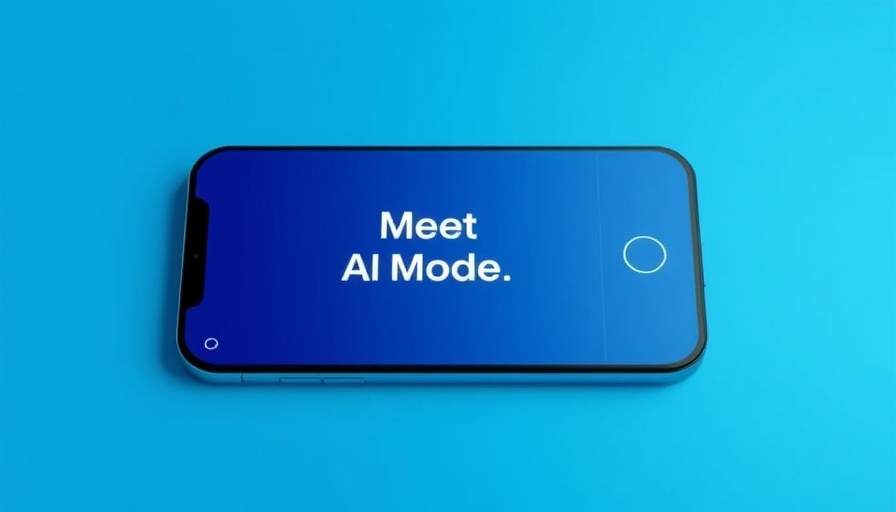
Revolutionizing Search: How Google's AI Mode Enhances User Experience
In just a few clicks, Google's new AI Mode is fundamentally altering the way we search for information online. Embedded within Google's search function, this innovative feature utilizes the capabilities of Gemini 2.5 to respond to user inquiries through text, images, and even voice. The essence of this new approach mirrors the conversational style of chatbots, yet it is integrated into the familiar Google environment, making it both accessible and efficient for users.
What is Google AI Mode?
Officially dubbed the “most powerful AI search,” Google AI Mode not only provides quick answers but also directs users to relevant sources. This interactivity allows for a more dynamic experience as users can ask follow-up questions, essentially having a conversation with the search results. It’s akin to a digital assistant who can sift through vast amounts of data to serve precise, useful information.
Accessible and User-Friendly: How to Use AI Mode
For business professionals, especially those in tech-centric fields, adapting to new technologies is vital. Fortunately, using Google AI Mode is straightforward:
- Start by Visiting the AI Mode: Users can access it through a dedicated link or by simply inputting a query into the Google search bar, then selecting the AI Mode tab.
- Select Your Query: Whether through text or by uploading an image, users can gain insights about everything from current events to product recommendations seamlessly.
- Explore Options: Once the query is submitted, AI Mode breaks down the answer and presents it in an engaging format complete with visuals and hyperlinks for deeper exploration.
Innovative Features to Enhance Information Retrieval
One standout feature in Google AI Mode is its ability to integrate visual searches. For instance, when a user uploads an image, like a street sign, the AI can provide pertinent local information, thus enhancing the relevance of search results based on real-time context. This could be a game-changer for marketers and CEOs looking to leverage real-time data in their campaigns.
Future Predictions: The Evolution of Search Technology
As of now, Google AI Mode is still in its experimental phase, primarily available in parts of the United States and India. Analysts predict that as its adoption spreads, it will fundamentally reshape user expectations around search interfaces. Gone will be the days of sifting through numerous pages for answers; users will expect AI-driven insights at their fingertips.
Challenges and Limitations to Consider
Despite its potential, Google AI Mode is not without limitations. While its capabilities are impressive, for specific searches—like the menu of a local restaurant—traditional search methods might still be more effective. Understanding when to leverage AI Mode versus conventional searches will be crucial for maximizing efficiency in information retrieval.
Embracing Change: The Business Impact of AI Search Tools
For CEOs and marketing managers, understanding the impact of AI Mode on search behaviors is critical. The ability to engage with information dynamically can open new doors for customer engagement strategies. As businesses begin to adapt to this technology, the focus will need to shift towards optimizing digital content to ensure visibility in AI-driven results.
Conclusion: The Future is Conversational
With Google AI Mode on the horizon, the way we interact with online content will shift towards more engaging, conversational experiences. By understanding how to effectively use this technology, business leaders can equip their teams to stay ahead in an increasingly AI-focused environment. Embrace this change and explore its potential benefits in your strategy. The future of search is indeed conversational, and the opportunity for innovation is ripe.
For those eager to leverage the advanced capabilities of Google AI Mode, it’s time to dive in. Engage with this tool and explore new pathways for enhancing your business's online presence and customer interactions.
 Add Row
Add Row  Add
Add 




Write A Comment